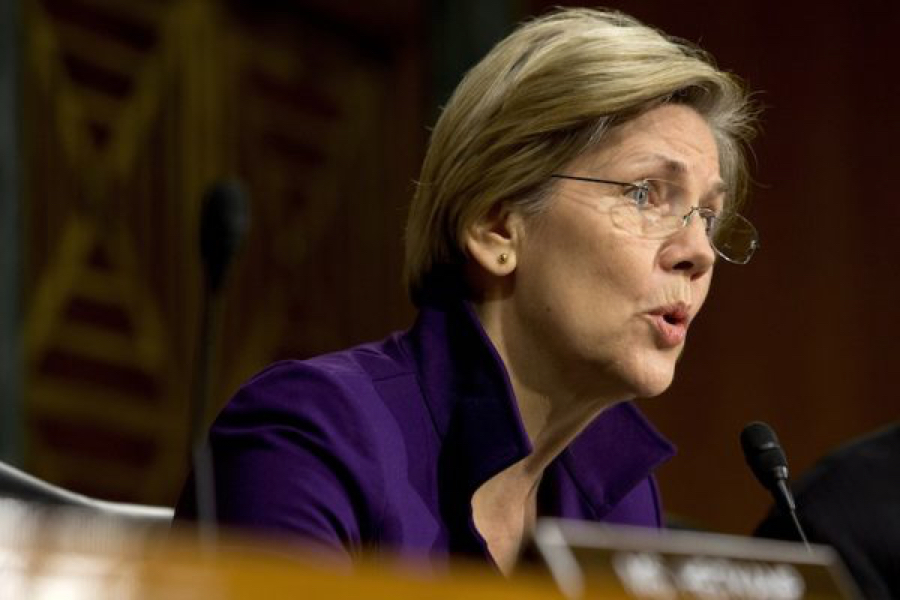Elizabeth Warren Took on the Native American Heritage Issue in a Surprise Speech
"I never used my family tree to get a break or get ahead," she said.

Photo via AP
Responding to the never-ending criticism from rivals about her claims of Native American heritage, Elizabeth Warren on Wednesday made a surprise appearance at a national conference to address the issue head-on.
“I get why some people think there’s hay to be made here. You won’t find my family members on any rolls, and I’m not enrolled in a tribe,” she said in front of the National Congress of American Indians in Washington, D.C., according to a transcript of her speech. “And I want to make something clear. I respect that distinction. I understand that tribal membership is determined by tribes, and only by tribes. I never used my family tree to get a break or get ahead. I never used it to advance my career.”
Accusations that she pretended to have Native American ancestry as a way to cheat the system have followed Warren since her 2012 race against Scott Brown. The criticism stems from the fact that she was listed as a minority on a law directory from 1986 to 1995 and was later touted by Harvard in 1996 as proof of the college’s diverse student body. Warren has always claimed that she heard of her Cherokee background through family stories, but there has never been conclusive evidence of her connection to the tribe.
Though former colleagues say her heritage didn’t help her get hired at Harvard and (most, but not all) of her relatives recall hearing similar stories about the family’s origins, the issue has never seemed to go away. It remains a favorite talking point for conservative pundits, political challengers, and the Republican National Committee. War whoops, images of headdresses, and references to “teepees” abound in TV spots, columns, and crude memes. The heat has made many of her allies uneasy, elicited negative reaction from some in the Native American community, and spurred criticism from sympathetic media figures like The Daily Show‘s Trevor Noah, who has called the situation “problematic.”
Warren did not provide any more proof of her ancestry on Wednesday, instead retelling a story about her parents’ courtship in Oklahoma, and the role she was told her mother’s Cherokee identity had on the marriage. “[M]y mother’s family was part Native American. And my daddy’s parents were bitterly opposed to their relationship. So, in 1932, when Mother was 19 and Daddy had just turned 20, they eloped.
“They’re gone,” she continued, “but the love they shared, the struggles they endured, the family they built, and the story they lived will always be a part of me. And no one—not even the president of the United States—will ever take that part of me away.”
WATCH: Elizabeth Warren addresses her claims of Native American heritage. https://t.co/lqBaR5SFmd pic.twitter.com/moqV4xKTtb
— The Boston Globe (@BostonGlobe) February 14, 2018
Among her most frequent critics on this issue, of course, is President Trump, who mocked the senator with the nickname “Pocahontas” while campaigning and then continued to do so in office. He stoked controversy in November when he used the name—which Warren later called a “racial slur”—during a ceremony honoring Native American veterans.
On Wednesday, Warren accused the president of using an offensive reference and papering over the dark history of a historical figure who was an unwitting child bride of a European settler. “Indigenous people have been telling the story of Pocahontas—the real Pocahontas—for four centuries. A story of heroism. And bravery. And pain,” she said. “And, for almost as long, her story has been taken away by powerful people who twisted it to serve their own purposes.”
She also pledged to push for protecting and expanding federally recognized native land, and to take on issues that impact the Native American community, such as opioid addiction, sexual violence against women, and inadequate access to the banking system and broadband internet. She also said she would speak more openly about those issues and bring them up whenever critics inevitably dredge up the issue of her family history.
“Our stories are deeply woven into the fabric of who we are. The stories of immigrants and slaves, of explorers and refugees, have shaped and reshaped our country right up to the present day. For far too long, your story has been pushed aside, to be trotted out only in cartoons and commercials,” she said. “So I’m here today to make a promise: Every time someone brings up my family’s story, I’m going to use it to lift up the story of your families and your communities.”
You can read the full speech here.


